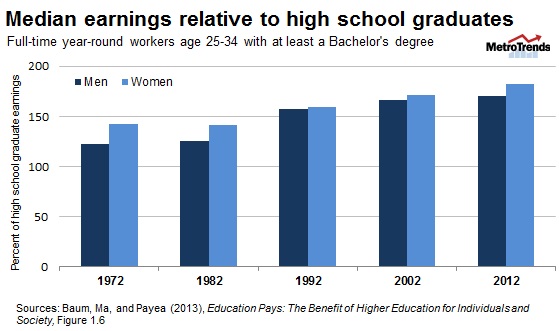
Some pundits and stories in the media have argued that the value of a college education is declining and that college isn’t worth the price anymore. They are wrong.
It’s important to refute these myths or people are likely to be deterred from continuing their educations and will lose out on important opportunities for improving their lives. (Next Monday the Urban Institute will host a panel discussion about the benefits of higher education.)
The data are clear. Even at current prices, postsecondary education pays off for most people in terms of higher pay, more job opportunities, better health, and a variety of other advantages. College graduates don’t just earn more, they are also more likely to be employed and more likely to work full time when employed. In 2012, four-year college graduates who worked full time, year round, earned 60 percent more than high school graduates. The gap was 69 percent for all workers and 79 percent if we include those seeking work.
But outcomes vary considerably both within and across levels of education and types of credentials. It is not surprising that there are examples of real people whose investment in college did not work out as well as they had hoped, and their outcomes also deserve our attention.
Getting the full benefit of a college education takes time
The stories of recent college graduates struggling in the labor market, while real and painful, are more signs of a weak economy than of the failure of higher education. Unemployment rates are over twice as high for high school graduates in the same age range. Also, the earnings premium for a college education grows as workers age so it takes time to reap the full benefits. Full-time workers ages 25 to 34 with bachelor’s degrees have a 53 percent earnings premium over high school graduates. That premium grows to 72 percent for those ages 35 to 44, and to 79 percent for workers ages 45 to 54.
But not all college graduates earn more than all high school graduates—at any age. One in six bachelor’s degree recipients working full time earns less than the median earnings for high school graduates working full time. There are many reasons for this, including occupational and geographical differences, as well as differences in individual circumstances.
The earnings premium has grown over time
So the payoff is high. Is it declining? Twenty years ago, men ages 25 to 34 with at least a bachelor’s degree, working full time, had median earnings 57 percent higher than high school graduates. In 2012, the gap was 70 percent. For women, the earnings premium grew from 59 percent to 82 percent.
Focusing on the most recent decade, when the earnings premium has been fluctuating, makes clear how people can tell different stories with the same data. Whether the premium has risen or fallen in the past few years depends on the chosen starting point. For both men and women, the earnings premium was higher in 2012 than in 2002, but it fell and rose in the intervening years. In any case, this question is less important than the reality that the earnings gap between college and high school graduates is very large and that, for most people, an investment in higher education pays off well.
Different postsecondary paths
Too much of the college-value debate focuses only on bachelor’s degrees. It is common to hear the suggestion that many students should pass on college and instead get specific vocational training. But that training usually takes place in community colleges or for-profit postsecondary institutions—in other words, it still involves going to college.
On the other hand, the earnings premium for certificates and associate degrees relative to high school diplomas is much smaller than the premium for bachelor’s degrees. And the premium is growing faster for higher levels of educational attainment.
But no average tells the story of all individuals. Investments in education after high school are not guarantees. Even if we focus only on the monetary value, the benefit a student can expect from a college education is uncertain. Moreover, when students start down their chosen paths, they cannot be certain they will make it to the finish line. Acknowledging that not all postsecondary paths are productive for all students (and that some are productive for very few) helps put the unfortunate but atypical stories into perspective. College pays off very well for most people. Better information and more generous funding could improve opportunities for many more.
Tune in and subscribe today.
The Urban Institute podcast, Evidence in Action, inspires changemakers to lead with evidence and act with equity. Cohosted by Urban President Sarah Rosen Wartell and Executive Vice President Kimberlyn Leary, every episode features in-depth discussions with experts and leaders on topics ranging from how to advance equity, to designing innovative solutions that achieve community impact, to what it means to practice evidence-based leadership.

